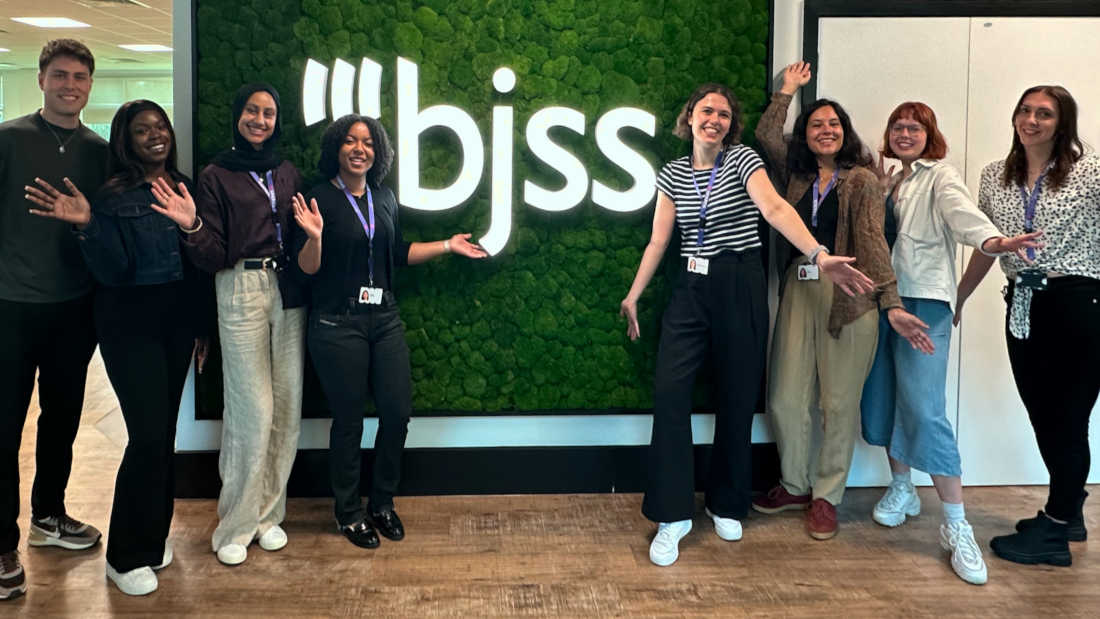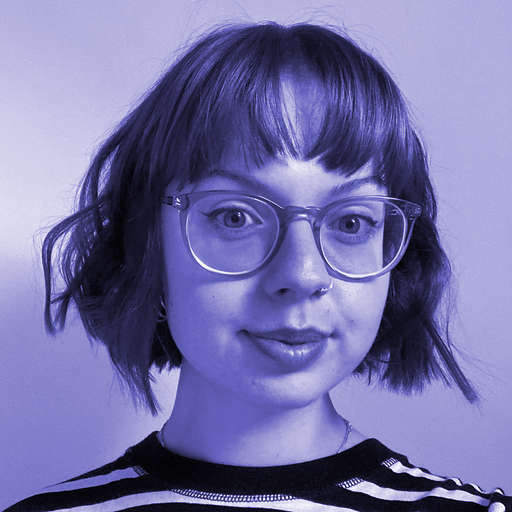I’ve just completed the Sparck Academy bootcamp and want to share my experience of the whole process, from application to graduation.
Hopefully, I can demystify the process and empower you to apply when the next Academy opens for applicants. Spoiler: you definitely should!
We don’t have a date for the next round yet but 2024 looks likely. To be the first to hear when applications are open, follow Sparck on LinkedIn.
Now, let me tell you about my Academy experience.
First, what is the Sparck Academy?
The Sparck Academy is a programme for bringing people into Sparck, and into careers in design. They’re usually recent graduates, or career changers.
It starts with a 5-week bootcamp which introduces you to, or provides a refresher, on key topics.
The round of the Academy I joined had a focus on user research and the bootcamp covered:
- research methods
- accessibility
- UK government standards (GDS)
- GDPR
Alongside developing your professional capability, the Sparck team will also build your confidence as a consultant too. It’s about helping you to meet client expectations and deliver successful projects.
Ultimately, the goal of the Sparck Academy is to provide you with the skills necessary to be a client-ready consultant. In my case, a user research consultant.
The bootcamp is an intense period of learning and how the Academy is delivered varies.
In my experience, there was an engaging mixture of topics delivered through presentations as well as opportunities to learn by doing through in-person workshops.
So far, Sparck has run three rounds of the Academy.
Who can apply?
Individuals who are ready for the challenge!
The User Research Academy was designed for people who are passionate about research and have some experience from professional or personal projects, and relevant skills and training.
Don’t dismiss the value of your soft and transferable skills. For example, active listening, empathy and a team player attitude are superpowers in user research.
Those of us who joined the 2023 Sparck Academy came from a variety of professions and disciplines. And the same can be said about the wider Sparck organisation too.
Of the 8 ‘Sparckies’ that joined the Academy:
- 4 were career changers, from teaching, sales and the charity sector
- 2 were graduates with experience in customer service and staff management
- 2 were recent graduates
There is no right or wrong route to join the design and research industry – we’ll just be glad you got here eventually!
The interview process
For most of us, interviews are a source of stress. But the Academy interview process isn’t designed to trip you up or act as a barrier.
For me, the process of applying to the Sparck Academy consisted of these steps:
- submit my application
- 15-minute phone call to discuss the Academy, Sparck and the interview process
- remote 1.5-hour interview including task presentation
- assessment day
I’m not a person who necessarily thrives in interviews. It takes me a lot of time to feel ready and to overcome imposter syndrome.
But the Sparck team showed a reassuring level of respect for candidates.
At each stage, I received clear communication on what and when the next steps would be, which made me feel more in control.
It also gave me space away from the process. If I knew to expect an update on Friday, I didn’t need to constantly check my emails all week.
As part of the remote interview, we were asked to complete a research challenge. Some might find that off-putting but the key is to not overthink it.
There is no right or wrong way to tackle the challenge.
As I discovered when speaking to other Academy Sparckies, our approaches when tackling the challenge were extremely diverse.
Just make sure you can rationalise your decisions, because that will demonstrate how you go about approaching and solving problems.
Interviewers will also be interested in seeing any research or design work you have done so far.
You might not have a fully developed portfolio, but that’s okay. Even just have a prototype or a project you’re proud of in some form that can be shared is fine.
Following the remote interview, we were invited to the assessment day, where we tackled a range of activities.
In all honesty, I was worried about the assessment day beforehand. I was anxious at the thought of ‘competing’ with others.
However, during the day, we were encouraged to get to know the other candidates.
It felt like a true reflection of what life is like at Sparck – working with people you might not have met before, recognising your strengths and weakness, and tackling ambiguity together.
The day closed with a ‘speed dating’ Q&A where we were given the opportunity to speak with a variety of colleagues at Sparck, from previous Academy graduates to members of the senior leadership team.
If you are successful, you are considered a full-time permanent colleague from the very beginning of the Academy.
The first week as part of the Sparck Academy
Sparck onboarding included introductions from Mike Buck, managing director at BJSS, and Rebecca Laycock, who led the Sparck Academy.
We were also connected with our user research practice and Academy buddies, who helped us settle in and answered any questions we had.
A highlight was being given the opportunity to work alongside the BJSS Engineering Academy.
For context, Sparck is the design capability within BJSS, and many projects include a blend of Sparck and BJSS colleagues.
In the first week, we completed two hackathons which exposed us to how we might work together on projects.
In this challenging environment, we navigated how user researchers and engineers could communicate clearly with one another, and honour agile ways of working.
I won’t lie and say the Academy is a walk in the park. It is difficult at times.
But Sparck make a habit out of continuously inviting feedback through channels like retrospectives.
Often, I found that I wasn’t the only one who struggled.
And when we illuminated changes that could be made, these ideas were taken onboard for future Academy programmes. (You’re welcome!)
Meeting the practices
We were also introduced to the various practices at Sparck such as content design, product design, service design, and strategy and innovation.
During these sessions, we were able to see just how multidisciplinary our teams are and how we can leverage all these skills to create truly user-centred outcomes.
These sessions also provided opportunities to build networks within the Sparck team, outside of the research practice.
The Sparckies welcomed us warmly into the team and offered support throughout the Academy, and beyond.
A big message we all took away was that if you love user research and want to focus just on that, great! But if you also find yourself intrigued by, say, content design, feel free to learn more.
You’re not put in a box and restricted to one role.
Sprint week
The learnings from the 5-week bootcamp culminated in the sprint week where we honoured agile ceremonies and worked in two teams on a typical Sparck brief.
We wrote research plans, conducted user interviews and usability tests, analysed the results and synthesised them to make data-driven recommendations.
Finally, we presented back to the wider Sparck community, who celebrated our achievements and provided helpful feedback that we could take into our first projects.
The end of an era
The academy came to an end at the start of October and since then we have begun working on client projects and supporting internal Sparck projects.
And even though we are no longer in our Academy bubble, the spirit of the Academy remains.
The Academy Sparckies and I have regular catchups and readily offer each other a helping hand.
Starting a new and potentially career-changing job can be overwhelming. But embarking on that journey with others makes it a lot easier.
I’ve also invited them to share some advice they would have benefited from hearing at the start of their journey.
A pep talk for future Academy applicants
Katie Poole: “Include any relevant previous work with your application. I didn't have a portfolio so I didn't attach one, but I had case studies that I probably should have sent.”
Katy de la Motte: “Don’t underestimate the skills you already have! UR and UX is all about solving problems, so think about times that you’ve made things better for people or solved a problem and the approach you took.”
Lisa Mortimer: “Try to include industry keywords in your CV to make your experience really clear. A lot of CVs come in – hundreds for this round – so make it easy to spot your strengths.”
Haleemah Ayoub: “All work experience is relevant but try and tailor your CV to include how a job you've had has helped you with the skill needed for the industry you're going into now. For example, working in retail has helped you develop patience and resourcefulness to creatively design solutions.”
Jamie Stanley: “One of the most important things when starting out is building your UX network. Being a career changer meant I was starting from zero. Get stuck in with local events and network with UX professionals. APDList and LinkedIn are super helpful. Be a sponge and learn from others.”
Kalista Gilfillian: “The SPARCK Academy is a great environment to learn and ask all your questions. You will be pushed out of your comfort zone so be prepared for that, but the culture is supportive, and everyone is there to help. I would also advise anyone in the Academy to keep good notes of all the sessions, maybe using Miro, so that you can come back to them when you join a project.”
Kai Greene: “If you have had a squiggly career or you're a career changer reach out to Academy alumni who have a similar background so you can get insights into how this experience could benefit you. This may be the confidence boost you need if you're feeling a bit unsure. And if you can't find anyone with a similar background, reach out anyway.”
Find out more about the Academy
For more information on the Academy, read Rebecca Laycock’s blog ‘Opening doors: reflections on the 2023 Sparck user research academy’.
There is no confirmed date for the next Sparck Academy but follow Sparck to be in the loop when applications open.



